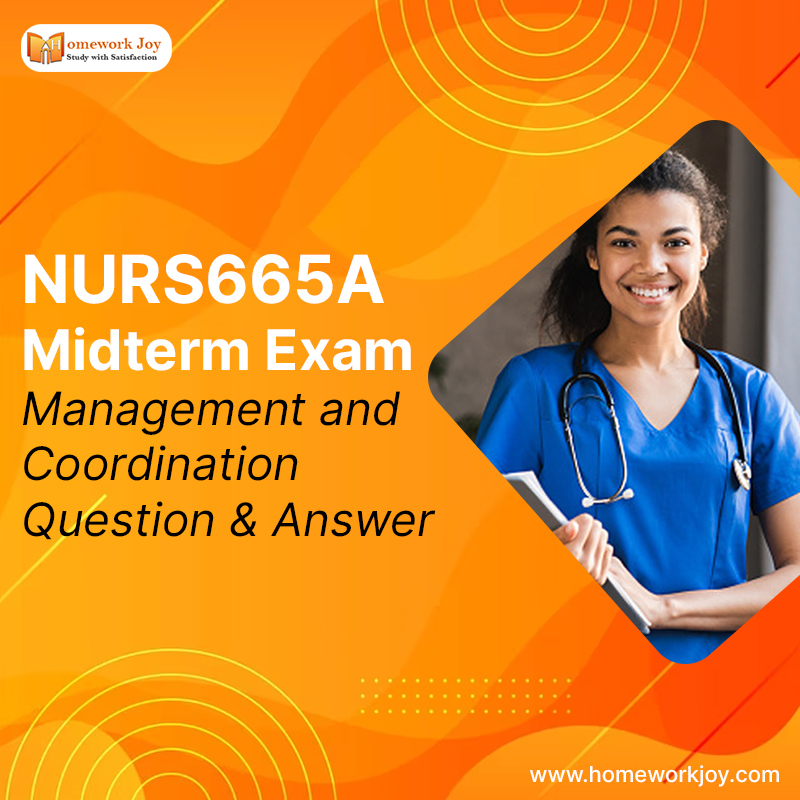As a nursing student, it can be challenging to manage and coordinate your workload while also staying on top of your studies. That’s why understanding effective management and coordination skills is essential for success in the field.
In this blog post, we will explore some questions and answers related to NURS665A Midterm Exam Management and Coordination.
Table:
|
Questions |
Link |
| 1. What is the difference between management and leadership? | Click Here |
| 2. How can effective communication enhance coordination and management in healthcare? | Click Here |
| 3. What are some common barriers to effective teamwork in healthcare? | Click Here |
| 4. How can conflict resolution skills be useful in healthcare management and coordination? | Click Here |
| 5. How can technology be used to improve healthcare management and coordination? | Click Here |
Question 1: What is the difference between management and leadership?
Management and leadership are often used interchangeably, but they are not the same thing. While both involve guiding and directing others toward a common goal, management is focused on the day-to-day operations of a team or organization. Leadership, on the other hand, is focused on inspiring and motivating others to achieve their full potential. In healthcare, effective management is essential for ensuring that patients receive high-quality care, while effective leadership is necessary for inspiring healthcare providers to go above and beyond for their patients.
Question 2: How can effective communication enhance coordination and management in healthcare?
Effective communication is crucial for successful healthcare management and coordination. When healthcare providers can communicate clearly and effectively with each other, they can coordinate their efforts more efficiently and provide better patient care. Good communication can also help prevent errors, misunderstandings, and other issues that can arise in the fast-paced and high-stress environment of healthcare. Some effective communication strategies include active listening, clear and concise language, and regular check-ins to ensure everyone is on the same page.
Question 3: What are some common barriers to effective teamwork in healthcare?
Effective teamwork is essential for successful healthcare management and coordination. However, there are several common barriers that can make it challenging to work together effectively.
Some of these barriers include the following:
- Lack of communication or poor communication skills
- Cultural or linguistic differences
- Differences in experience or training
- Lack of trust or respect between team members
- Personal conflicts or egos
- Inadequate resources or support
Overcoming these barriers requires open communication, a willingness to listen and understand others, and a commitment to working together toward a common goal.
Question 4: How can conflict resolution skills be useful in healthcare management and coordination?
Conflict is inevitable in any workplace, and healthcare is no exception. However, conflict can be especially challenging in healthcare, where high stakes and intense emotions can make it difficult to resolve issues effectively. That’s why conflict resolution skills are crucial for successful healthcare, NURS665A Midterm Exam management and coordination. By learning how to manage conflict effectively, healthcare providers can resolve issues quickly and efficiently, without disrupting patient care or team dynamics. Some effective conflict resolution strategies include active listening, empathy, compromise, and mediation.
Question 5: How can technology be used to improve healthcare management and coordination?
Technology has the potential to revolutionize healthcare management and coordination, making it easier and more efficient to provide high-quality patient care. Some examples of how technology can be used to improve healthcare management and coordination include:
- Electronic medical records (EMRs) that can be accessed by healthcare providers from anywhere, allowing for more coordinated care and improved patient outcomes.
- Telemedicine, which allows healthcare providers to connect with patients remotely, improving access to care and reducing the need for in-person visits.
- Mobile health (mHealth) apps, which can help patients manage their health and communicate with their healthcare providers more effectively.
- Predictive analytics, which can help healthcare providers identify patients at risk for certain conditions or complications, allowing for earlier intervention and improved outcomes.
- Wearable devices, which can track patient data and provide real-time feedback to healthcare providers, allowing for more personalized care.
By leveraging these and other technologies, healthcare providers can improve communication, streamline workflows, and provide better, more coordinated care to patients.
Conclusion
Effective NURS665A Midterm Exam management and coordination are essential for success in healthcare. By understanding the differences between management and leadership, leveraging effective communication strategies, overcoming common barriers to teamwork, developing conflict resolution skills, and utilizing technology to improve patient care, healthcare providers can work together more efficiently and provide better outcomes for their patients. As a nursing student, it’s essential to start developing these skills early on, as they will be critical to your success in the field.
